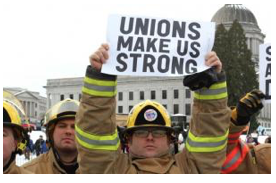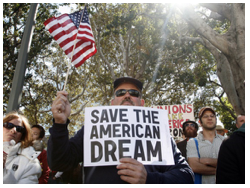CommentsLABOR DAY 2017--To many of us, September’s’ first Monday is a three-day weekend to close out the summer season with burger and hot dogs on the grill, pool parties, a last wearing of white pants. But, historically, Labor Day was created by the Labor Movement to celebrate the social and economic achievements of American workers.
To bring us back to the meaning of Labor Day, let’s examine policy shifts in the Trump administration -- as well as some 2017 changes in the state of California.
Donald J. Trump’s populist campaign no doubt lured in the support of many in the workforce -- but at the end of the day, his policies are aligned more with Presidents Ronald Reagan, George W. Bush, and big business than with protecting the rights of employees.
Those who lived through the Reagan era or may have read about the Gipper’s administration will remember our 40th president was known as a Union Buster but his anti-labor policies hardly stopped there. President Reagan worked to lower the minimum wage for younger workers, to lessen restrictions on child labor and anti-sweatshop laws; he taxed fringe benefits and cut back on unemployment job training. Within the federal government, he attempted to replace permanent workers with temporary workers who would lack union and civil service protections.
Under Reagan’s administration, one in three Occupational Safety and Health Administration Offices (OSHA) were shuttered, OSHA’s staff was cut by 25 percent, and penalties for employer violations were slashed by 75 percent.
Workers didn’t fare any better under the policies of George W. Bush. The 41st president’s Labor Secretary, Elaine Chao and other high level appointees aimed to weaken the agency of their charge. (Sound familiar?)
Under Chao, the department supported the appeal of a rule that would have placed protections for workers who experienced repetitive motion injuries, a leading cause of employment injuries. Chao hampered the Wage and Hour Division -- which deals with overtime, minimum wage, and child labor laws.
According to the Government Accountability Office, the agency typically failed to pursue employers for back wages and under Chao’s watch, adjusted for cost of living, the minimum wage fell to its lowest level in fifty years.
Under George W. Bush, industrial safety regulations across a variety of industries, from mining and the chemical manufacturing to construction were essentially stripped, leading to increased deaths and injuries.
President Trump is quickly headed on a trajectory to match both Reagan and George W. Bush.
 Trump on Gender Pay Gap
Trump on Gender Pay Gap
In the U.S., women earn an average of $.79 on the dollar earned by white men -- and the gap is wider for women of color. This gap ranges per multiple variables -- and we need more data to help achieve equal pay for equal work.
However, the Trump Administration announced it would block a change to a rule generated under the Obama administration that would have required salary data reporting by gender, race, and ethnicity for businesses with over 100 employees. On August 29, the Office of Management and Budget announced a review and immediate stay of the EEOC’s EEO-1 Report to collect this data.
The reasoning behind the block, supported by Ivanka Trump, is that reporting places a “burden” on businesses.
Fair Pay and Safe Workplaces Executive Order
Within just a few months of taking office, President Trump revoked the Fair Pay and Safe Workplaces EO enacted under President Obama that mandated any companies with federal contracts to comply with labor and civil rights laws, including an end to forced arbitration for targets of sexual harassment and assault.
Mandatory Arbitration Agreements
The Trump administration has also aligned with the employer’s position in a Supreme Court case on mandatory arbitration agreements, which waive the rights of employees to file class or collective actions. Last November, President Obama’s solicitor general filed a petition to support the National Labor Relations Board in a case involving Murphy Oil, which claims such agreements are a violation of employee rights, one of three cases currently under review.
However, under Trump’s administration, the acting solicitor general has presumed an opposite stance, filing a brief that states mandatory arbitration agreements are enforceable under the Federal Arbitration Act.Overtime
In June, the Labor Department filed a federal appellate court brief addressing the current administration will not advocate for overtime changes set under Obama’s administration that would have extended overtime eligibility to millions of workers. The threshold for overtime eligibility would have risen to cover anyone employees paid less than $47,476 a year who worked over 40 hours a week. The previous cut-off, which has been set since 2004, was $23,600. The change was to go into effect December 1 but was blocked by a federal judge in Texas; the Obama labor department appealed.
OSHA Rules
Under the Trump administration, OSHA has delayed three safety rules issued in 2016 under President Obama, raising questions as to whether these laws will be rescinded or changed. Under these rules, employers in certain industries would have been mandated to submit injury and illness data electronically for posting on the OSHA website. Additional laws would have changed exposure limits for silica, linked to lung disease,and to beryllium, an industrial mineral linked to lung cancer.
Slashing Labor Department Budget
The proposed budget under Trump would include deep cuts to the Labor Department, from $12.1 billion to $9.7 billion, most of which would be slashed from workforce training program. The administration wants to shift funding to states, localities, and employers.
Curiously, certain parts of the agency will see a boost in funding -- including a 22 percent jump for the Office of Labor-Management Standards, responsible for investigating misconduct in private sector-unions. Shades of Reagan?
Apprenticeships
The president has signed an EO to double federal grant money available for apprenticeship programs -- while cutting federal government monitoring and oversight.
Conclusion
If we’re to judge by these policy shifts and more, the Trump administration is on a fast track toward business-centric deregulation and a weakening of labor support.
Meanwhile, closer to home, California has initiated several policies changes in 2017 that are friendlier to workers.
 California Overtime Laws
California Overtime Laws
Although the Trump administration is dropping the ball on overtime, in California, all employees will be paid time-and-a-half per hours worked beyond eight hours; and those who work 12 hours in a day will be paid double-time for hours above 12 hours. In addition, any employee who works 7 days in a week must be paid time-and-a-half for that seventh day or double-time for anything in excess of eight hours on the seventh day.
If a business or employer tries to get around the overtime law by misclassifying an actual employee as an independent contractor can face fines of up to $25,000.
Inclusion
The California Fair Pay Act extends equal pay for similar work to include race and ethnicity, as well as gender. The state has passed the All Gender Bathroom Bill -- which prohibits businesses from classifying “male” or “female’ bathrooms for a single-user facility.
In addition, the state has passed a law to require all employers to notify employees that they have the right to take protected time off to deal with matters related to domestic violence, sexual assault, or stalking.
Happy Labor Day.
(Beth Cone Kramer is a Los Angeles writer and a CityWatch columnist.)
-cw
















